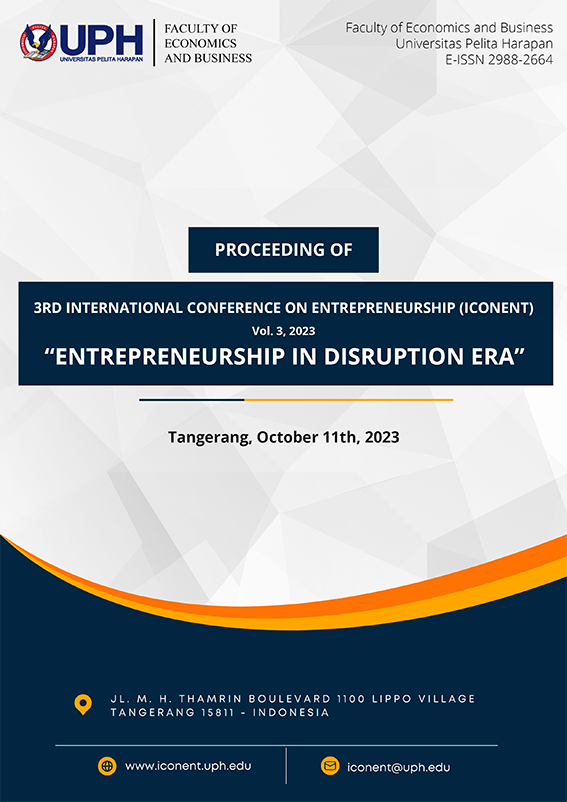Investigating the Competitive Advantage in the Green Bean Coffee Supplying Company Business: PT Trio Lestari
Keywords:
agriculture, green bean, competitive advantage, case studyAbstract
Indonesia was the world's third largest coffee exporter with a total export volume of 1.2 million bags, while domestic coffee consumption in 2015/2016 made it the second largest exporter by total export volume. 1.2 million bags. This follows Brazil's coffee consumption of 4.5 million bags. Robusta accounts for 90% of domestic coffee raw material production, and Arabica accounts for the remaining 10% and it is still slowly growing to this day. Reflecting on the high demand coffee beans in the agriculturesideof the business especially in Indonesia,itis somehow an old fashioned and less talked about however a very interesting case on how the sector has been struggling to achieve a consistent growth and success. In recent years especially has been tough for the business because of predicted uncontrollable climate change and newcomers coming into the business. The researchers are using PT Trio Lestari as a respective case study to analyze the businesses' sector current stateand howits competitiveadvantageworkinthe challenges that the agriculture industry and its competitions has to offer. This research uses qualitative method with objective data collection and interviews with the subjects in various fields starting from its respective owners, employeesandto their business partners. The findings of this research are the latent variables that contributes into the competitive advantage of the company such as Entrepreneurial Journey Experiences, Personal Level B2B Partner’s Trust, Trustworthy Company Reputation, Good Relationship and Working Environment for Employees, The Sense of Familiness, Competitive Product Pricing, Convenience in Transactions and Services. The study will allow other potential research to dig deeper on the agricultural sector of the coffee business.
References
Ahmed, S., Brinkley, S., Smith, E., Sela, A., Theisen, M., Thibodeau, C., Warne, T., Anderson, E., Van Dusen, N., Giuliano, P., Ionescu, K. E., & Cash, S. B. (2021). Climate change and coffee quality: Systematic review on the effects of environmental and management variation on secondary metabolites and sensory attributes of Coffea Arabica and Coffea canephora. Frontiers in Plant Science, 12. https://doi.org/10.3389/fpls.2021.708013
Akhtar E., & Sultan M. (2023). VRIO Analysis Framework in Project Management (PM) Comprehensive Approach. International Journal of Business and Management Invention (IJBMI) ISSN, 12, 57-72. https://doi.org/10.35629/8028-12025772
Barney, J. (1991). Firm resources and sustained competitive advantage. Journal of Management, 17(1):99- 120.
Belinda, Y. (2023, June 22). Coffee in short supply globally, but Indonesia’s growers fail to gain. Asia News Network. https://asianews.network/coffee-in-short-supply-globally-but-indonesias-growers-fail-to-gain/
Birdthistle, N., & Hales, R. (2023). The meaning of being a family business in the 21st Century. Attaining the 2030 Sustainable Development Goal of Responsible Consumption and Production, 11-20. https://doi.org/10.1108/978-1-80455-840-920231002
Efendi, B., Zulmi, A., & Rangkuty, D. M. (2021). Family Business Resilience Strategy in Indonesia. Jurnal Kajian Ekonomi Dan Kebijakan Publik, 6(1).
Eisenhardt, K. M. (1989). Building theories from Case Study Research. The Academy of Management Review, 14(4), 532. https://doi.org/10.2307/258557
Eisenhardt, K. M. (2021). What is the Eisenhardt method, really? Strategic Organization, 19(1), 147-160. https://doi.org/10.1177/1476127020982866
Farida, I., & Setiawan, D. (2022). Business strategies and competitive advantage: The role of Performance and Innovation. Journal of Open Innovation: Technology, Market, and Complexity, 8(3), 163. https://doi.org/10.3390/joitmc8030163
Ferraro, O., & Cristiano, E. (2021). Family business in the digital age: The state of the art and the impact of change in the estimate of economic value. Journal of Risk and Financial Management, 14(7), 301. https://doi.org/10.3390/jrfm14070301
Lahasan, L., Yusriadi, Y., & Nurhaedah, N. (2022). Analisis Usaha Pengolahan Biji Kopi Robusta. Jurnal Ilmiah Ecosystem, 22(1), 147-155. https://doi.org/10.35965/eco.v22i1.1400
Lanka, E., Lanka, S., Rostron, A., & Singh, P. (2021). Why we need qualitative research in management studies. Revista de Administração Contemporânea, 25(2). https://doi.org/10.1590/1982-7849rac2021200297.en
Lubis, S. N., & Jufri, M. (2022). Comparative analysis of added value of green bean and roast bean in Bener Meriah Regency, North Sumatra Province, Indonesia. Agro Bali: Agricultural Journal, 5(3), 470-476. https://doi.org/10.37637/ab.v5i3.1049
Noble, H., & Smith, J. (2015). Issues of validity and reliability in qualitative research. Evidence Based Nursing, 18(2), 34-35. https://doi.org/10.1136/eb-2015-102054
Oktavia, I., Efferin, S., & Darmasetiawan, N. K. (2020). Leadership and innovation in Family Business. KELUWIH: Jurnal Sosial Dan Humaniora, 1(1), 1-10. https://doi.org/10.24123/soshum.v1i1.2852
Zaki, A., Rahayu, M., & Susilowati, C. (2018). Strategies for successful family-owned business. JURNAL APLIKASI MANAJEMEN, 16(2), 215-223. https://doi.org/10.21776/ub.jam.2018.016.02.04

 Fakultas Ekonomi dan Bisnis | Universitas Pelita Harapan | Kampus Universitas Pelita Harapan | Gedung F Lt. 12 | Lippo Karawaci, Tangerang - 15811 | Telp 021-5460901 | Fax 54210992
Fakultas Ekonomi dan Bisnis | Universitas Pelita Harapan | Kampus Universitas Pelita Harapan | Gedung F Lt. 12 | Lippo Karawaci, Tangerang - 15811 | Telp 021-5460901 | Fax 54210992